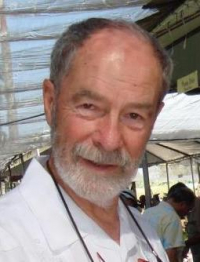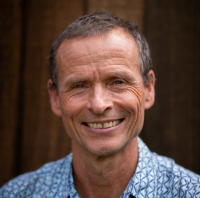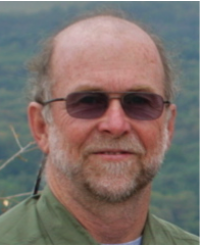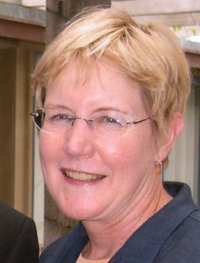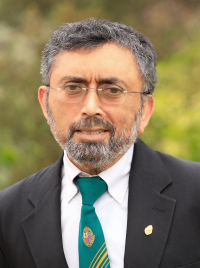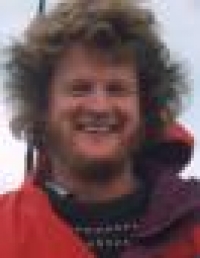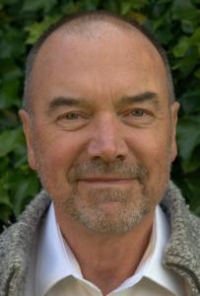Human and Non-Human Cultures
Biographical Sketches: Speakers
University of California, Santa Barbara
Don Brown, Professor Emeritus of Anthropology at UCSB, is a sociocultural anthropologist. His research interests are in human universals and the relationship between features of human nature and patterns in human society, culture, and history. He is the author of two books on these topics: Hierarchy, History, and Human Nature and Human Universals. His current research is on the ethnocentric complex and is directed toward discovering its features through the study of human affairs while seeking other means to provide both proximate and ultimate (evolutionary) explanations for the complex. He is a past Chair of his department.
UC San Diego
UC San Diego
Pascal Gagneux is CARTA's Executive Co-Director, a Professor of Pathology and Anthropology, and the Department Chair of Anthropology at UC San Diego. He is interested in the evolutionary mechanisms responsible for generating and maintaining primate molecular diversity. The Gagneux laboratory studies cell-surface molecules in closely related primates species. His focus is on glycans, the oligosaccharides attached to glycolipids and glycoproteins of the surfaces of every cell and also secreted into the extra-cellular matrix. Gagneux's laboratory is exploring the roles of molecular diversity in protecting populations from pathogens as well as potential consequences for reproductive compatibility. Dr. Gagneux’s interest is in how glycan evolution is shaped by constraints from endogenous biochemistry and exogenous, pathogen-mediated natural selection, but could also have consequences for sexual selection. Dr. Gagneux has studied the behavioral ecology of wild chimpanzees in the Taï Forest, Ivory Coast, population genetics of West African chimpanzees, and differences in sialic acid biology between humans and great apes with special consideration of their differing pathogen regimes. In 2011, while Associate Director of CARTA, Dr. Gagneux helped to establish a graduate specialization in Anthropogeny at UC San Diego. This wholly unique graduate specialization is offered through eight participating graduate programs in the social and natural sciences at UC San Diego.
UC San Diego
Jim Moore is an emeritus associate professor of the Department of Anthropology at UC San Diego. His research is on the behavioral ecology of modern primates, with specific interest in the use of insights gained from such work to aid our understanding of Plio-Pleistocene hominins. For most of his career, this work has been carried out on savanna-living chimpanzees at Ugalla in western Tanzania, as a member of the Ugalla Primate Project (now https://www.gmerc.org/). He also has written extensively about the relationship between demography and behavior (specifically, nepotism and dispersal) in primates.
Ugalla is one of the driest and most open sites at which chimpanzees live, and is one of only three active savanna chimpanzee study sites. It has a full complement of predators (lion, leopard, hyena and wild dog) as well as elephant, zebra, roan and at least seven other species of primate. The main study community has over 60 individuals; unfortunately (but interestingly) the prevalence of SIVcpz (the chimpanzee version of HIV) is about 30%. Population density is less than 1/20th of forested sites like Gombe or Kibale.
Understanding how chimpanzee behavior and social structure is influenced by adaptation to savanna life (either directly by the distribution of resources and predators, or indirectly via the effects of population density) can help us understand the scope of chimpanzee biocultural adaptation, as well as help generate, refine, and hopefully test models of early hominin evolution in very similar savanna-woodland environments.
University of California, Los Angeles
Susan Perry is a Professor of Anthropology at the University of California, Los Angeles. Dr. Perry's primary research interests include primate social relationships, primate social cognition, communication; capuchins, macaques. Susan Perry founded the Lomas Barbudal Monkey Project in 1990, with the help of Joseph Manson and Julie Gros-Louis, for the purpose of studying social intelligence in the white-faced capuchin, Cebus capucinus. In the past 17 years of almost continuous observation, the Lomas Barbudal capuchins have become one of the most intensively studied wild monkey population in the world.
UC San Diego
Margaret Schoeninger is Distinguished Professor Emerita of Anthropology at UC San Diego, a Research Archaeologist in the Glenn Black Laboratory of Archaeology at Indiana University, and Emerita Co-Director of CARTA. She has done fieldwork in North America, Mexico, Pakistan, India, Kenya, and Tanzania as well as laboratory research on carbon, nitrogen, and oxygen stable isotope ratio analysis in biological tissues and food component analysis of traditional foods. Her major interest is in the evolution of human diet particularly as it informs our understanding of the appearance and evolution of the human lineage.
University of Cambridge
Rupert Stasch received his Ph.D. from the University of Chicago in 2001, and joined the faculty at UC San Diego in 2008. In January 2015, he moved to the University of Cambridge. He studies the mediation of social life by processes of representation. His main methodological and theoretical approaches derive from semiotic and linguistic anthropology, from the heritage of symbolic anthropology and anthropological structuralism, and from writings in philosophy, social theory, and contemporary anthropology which seek to open in general terms the question “What is a social relation?” Since 1995, Stasch has carried out eighteen months of fieldwork with Korowai speakers of southern West Papua, Indonesia, focused on Korowai people’s own culturally distinctive sensibilities about social bonds. His main publications have examined how Korowai take up qualities of separation and otherness as a central, productive basis of social relating.
Stasch’s current research project is an ethnographic study of interaction between Korowai and international tourists. Since the mid-1990s, Korowai have become famous in the global mass media and in the adventure tourism industry, for being iconic “tribal” people who are a perfect fit to Westerners’ stereotypes of “primitive” humanity.
Stasch’s research focuses on Korowai and tourists’ culturally motivated hopes and dreams about each other, the great value each side finds in their interaction despite mutual incomprehension and misconstrual, and the processes of learning and transformation that different persons go through in these intercultural encounters.
University of St Andrews
Peter Tyack is a Senior Scientist and Walter A and Hope Noyes Smith Chair in the Biology Department of the Woods Hole Oceanographic Institution. He is interested in social behavior and acoustic communication in whales and dolphins, and has conducted research on bottlenose dolphins, sperm whales, humpback whales, gray whales, right whales and beaked whales. He has focused on developing new techniques to monitor vocal and social behavior of marine mammals. These include methods to tag whales, to locate their calls and for video monitoring of behavior. Tyack’s research has focused on how these animals use sound for critical activities. This made him sensitive to the possibility that human-made sounds might pose a risk to marine mammal populations by disrupting critical behaviors. He has been involved in the design, planning and field work for a series of experiments investigating the possible impact on marine mammals of human-made sources of noise. The DTAG developed by Tyack and Johnson allows similar experiments with deep diving whales whose behavioral responses to noise have previously been impossible to study.
UC San Diego School of Medicine
Ajit Varki is a Distinguished Professor of Medicine and Cellular & Molecular Medicine, Emeritus Co-Director of CARTA, Emeritus Co-Director of the Glycobiology Research and Training Center at UC San Diego, and Adjunct Professor at the Salk Institute. He received basic training in physiology, medicine, biology, and biochemistry at the Christian Medical College (CMC), Vellore, The University of Nebraska, and Washington University in St. Louis. He also has formal training and board certification in internal medicine, hematology, and oncology. Varki is the executive editor of Essentials of Glycobiology (Cold Spring Harbor Press, 4th Edition, 2022) and is recipient of a MERIT award from the NIH, and an American Cancer Society Faculty Research Award. Honorific elections include the American Academy of Arts and Sciences, the National Academy of Medicine, the American Society for Clinical Investigation, and the Association of American Physicians. He is also recipient of the three highest honors in his field, the Karl Meyer Award of the Society for Glycobiology, the International Glycoconjugate Organization Award and the Rosalind Kornfeld Award for Lifetime Achievement in Glycobiology. He is recognized for creating the first major open access research journal (J. Clin. Invest., 1996) as well as the first major open access textbook (Essentials of Glycobiology, 2009). He was honored with the Old Cottonian of Eminence Award at the 150th Anniversary of Bishop Cotton Boys School, Bangalore, India, (2015) as well as a Distinguished Faculty Medal and Oration at his medical school alma mater, CMC, Vellore. Significant past appointments include: Co-Head, UC San Diego Division of Hematology-Oncology; President of the Society for Glycobiology; Editor-in-Chief of the Journal of Clinical Investigation; Interim Director of the UC San Diego Cancer Center, President of the American Society for Clinical Investigation, and UC San Diego Associate Dean for Physician-Scientist Training. Varki's research interests are focused on a family of cell surface sugars called sialic acids, and their roles in biology, evolution and disease. Currently, active projects are relevant to the roles of sialic acids in microbial infectivity, the regulation of the immune response, the progression and spread of tumors, aging, and unique aspects of human evolution. His group is particularly intrigued to find multiple interrelated differences in sialic acid biology between humans and our closest evolutionary cousins, the "great apes." These differences are a signature of the events that occurred during the last few million years of human evolution, and appear to be relevant to understanding several aspects of the current human condition, both in health and disease. Varki’s book, Denial (Twelve, Hachette Books, 2013), explores a novel "Mind Over Reality Transition” (MORT) theory that denying reality and personal mortality was a key step in allowing the emergence of a full theory of mind, and in the origin of our species.
Dalhousie University
Hal Whitehead's work is mainly on the behaviour (principally social organization and cultural transmission), ecology and population biology of sperm and northern bottlenose whales. He has ongoing research projects in the eastern Pacific (sperm whales since 1985) and northwest Atlantic (sperm whales since 1986, bottlenose whales off Nova Scotia since 1988). He spends weeks at sea on board ocean-going sailing boats collecting acoustic, visual, photographic and oceanographic data, and then long periods analyzing them in the lab. Hal's research is principally on the behaviour, social structure, population biology and conservation of sperm whales, techniques of studying social structure, and more general questions about social structure in mammals and cultural evolution.
University of St. Andrews
Andrew Whiten is Professor of Evolutionary and Developmental Psychology and Wardlaw Professor of Psychology at the University of St. Andrews. He conducts research on the evolution and development of mind and behaviour.
Recent and current studies have focussed on theory of mind (mindreading), imitation, social learning, culture, cooperation and related aspects of social cognition in both captive and wild non-human primates as well as normal and autistic children.
New Mexico State University
Timothy Wright is an associate professor of biology at New Mexico State University. His research focuses on the function and evolution of vocal communication in parrots. Across the animal kingdom, the ability to learn vocal signals is restricted to a few evolutionarily distinct groups (songbirds, hummingbirds and parrots among birds; humans, bats and whales among mammals). Parrots are renowned for their vocal mimicry abilities in captivity, but less is known about how learning is used in the wild. Thus, they present opportunities for understanding how learning shapes communication behavior, how the use of learned vocalizations differs between species, and why this ability evolved in the first place. These core interests have expanded through the years to a variety of related questions regarding the systematics of parrots, the evolution of their impressive longevity, and how best to conserve endangered parrot species that he approaches collaboratively with other researchers and organizations. Wright tackles these questions through a broad range of approaches including field observations, sound analysis, telemetry, captive studies, playback experiments, psychoacoustics and molecular population genetics and phylogenetics. Students in Wright’s lab make use of these techniques or invent new ones as appropriate to investigate their own questions in behavior and evolution.
